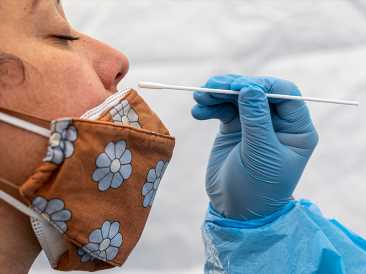
- Since Omicron became the dominant SARS-CoV-2 variant worldwide, scientists have been trying to determine whether having Omicron could protect against infections with other variants.
- A pre-print study from South Africa has found that people vaccinated against COVID-19 and then contracting the Omicron variant had increased protection against the Delta and Beta variants.
- Meanwhile, those who were unvaccinated but had contracted Omicron mounted immunity only to infections with Omicron.
- Researchers believe their findings will impact the development of new vaccines for Omicron and future variants of concern (VOCs).
Toward the end of 2021, scientists reported a new variant of SARS-CoV-2, which would become the fifth VOC as declared by the World Health Organization (WHO).
The variant called Omicron (B.1.1.529) sparked the fourth wave of coronavirus in South Africa and soon became the dominant global strain.
Although much is still unknown, research shows that the Omicron variant spreads more quickly than previous variants. Although it seems to be causing less severe illness in most people, about 500,000 people globally have died from COVID-19 since last November, when Omicron emerged.
Since then, scientists have tried to determine whether widespread infection with Omicron, COVID-19 vaccines, or both, could confer protection against other variants.
Researchers from the National Institute for Communicable Diseases and other institutions in South Africa conducted a study to find out. They identified that being vaccinated against COVID-19 and later experiencing a “breakthrough” infection from the Omicron variant may boost protection against other SARS-CoV-2 variants.
The research team believes their study results may have implications for making the next generation of COVID-19 vaccines based on Omicron.
Their findings appear on the pre-print online archive medRxiv, which reports preliminary, non-peer-reviewed studies.
Testing immune response to Delta, Beta
According to the research team, genomic surveillance — tracking the genetic material of SARS-CoV-2 variants — shows both Beta and Delta variants are still present in South Africa.
This knowledge helped drive this new study led by Prof. Penny L. Moore, research professor and DST/NRF South African Research Chair of Virus-Host Dynamics at the University of the Witwatersrand (Wits) and the National Institute for Communicable Diseases, and research associate at CAPRISA, University of KwaZulu-Natal.
For the study, Prof. Moore and her team used blood samples from seven vaccinated and 20 unvaccinated South African residents who had previously contracted COVID-19 during the Omicron pandemic wave.
Out of the seven vaccinated individuals, two had received the Johnson & Johnson, and five received the Pfizer vaccine.
Scientists tested the blood samples to see if exposure to the Omicron variant created antibodies that triggered certain immune responses against the Beta and Delta variants.
This is called humoral response, where certain cells in the plasma portion of the blood learn to make antibodies against a specific antigen. An antigen is a molecule or foreign substance that makes them produce an immune response.
“We were trying to understand how good the immune response to an Omicron infection was, both in previously uninfected and in vaccinated individuals,” Prof. Moore told MNT.
“We have previously shown that different variants trigger antibodies with different levels of cross-reactivity for other variants, and thus hypothesized that the same may be true for Omicron. We show that Omicron triggers better responses to itself than to other variants.”
– Prof. Penny L. Moore
During the study, the research team found vaccinated individuals experienced a “significantly boosted” humoral response against other VOCs.
The opposite occurred with blood samples from people who had not had a vaccination. Researchers found the humoral response to other VOCs within those samples was notably lower.
When asked why the Omicron variant elicits larger humoral responses in vaccinated individuals rather than unvaccinated people, Prof. Moore explained that it was not specific to the Omicron variant.
“All SARS-CoV-2 infections trigger better responses in previously vaccinated individuals than in unvaccinated individuals,” she said.
“This is because the vaccination has effectively primed our immune systems,” she added.
Influencing future vaccine development
The researchers say that the lower humoral response to VOCs by unvaccinated individuals after contracting Omicron could make them more susceptible to reinfection with older variants. This could prove problematic as they remain in circulation and new variants emerge.
Prof. Moore believes that their research will have an impact on development strategies for new vaccines for Omicron, as well as future variants.
“We believe that (this) data suggest that vaccines that are being designed based on the sequence of Omicron may not necessarily be superior to the current vaccines,” she explained.
MNT also spoke with Dr. Shahyar Yadegar, critical care medicine specialist, pulmonologist, and medical director of the ICU at Providence Cedars-Sinai Tarzana Medical Center in Tarzana, CA, about this research and what it might mean for future COVID-19 vaccine development.
“While this research has yet to be peer-reviewed and is limited to a very small sample size, the study’s implications help support the continued need for research into vaccine-induced immune responses in an ever-changing pandemic,” Dr. Yadegar said.
“As variants of concern continue to emerge globally, greater understanding of vaccine efficacy and protection is essential toward upholding principles of patient safety, decreasing mortality, and improving patient outcomes,” he added.
As for the next steps of this research, Prof. Moore said she and her team plan to “continue to try to understand how the immune response to Omicron differs from that triggered by other variants of SARS-CoV-2, as we believe this has important implications for vaccine design.”
Dr. Yadegar told MNT that he would like to see this research applied to larger populations across multiple varied geographic areas to help control for possible confounding variables.
“Broad epidemiological studies are also useful to evaluate the long-term effects on vaccinated versus unvaccinated patients, with correspondence to variants of concern in geographic location, vaccine accessibility, and socioeconomic and public health data to better develop a holistic view,” he said.
Source: Read Full Article
